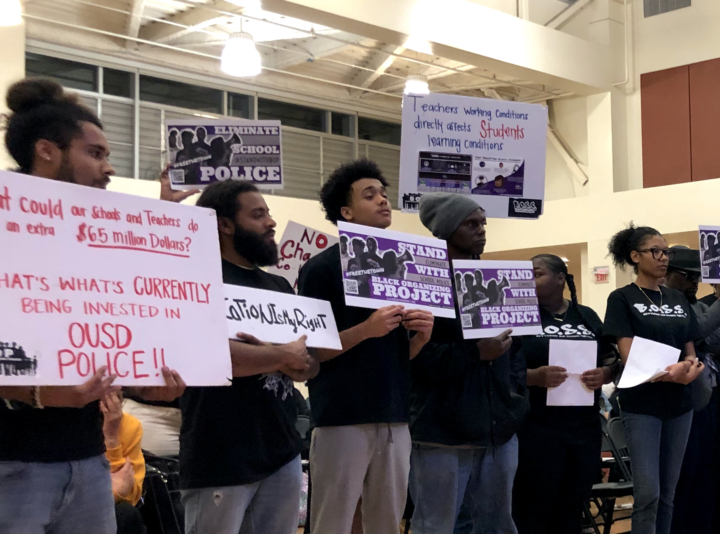Oakland
Population: 440,646 in 2020
Type of government: City

Activists with Black Organizing Project urge removal of police from Oakland schools and reallocation of that funding. (Source: Black Organizing Project via Berkeleyside)
In 2020, the Oakland City Council reduced the Oakland Police Department (OPD) budget for FY 2020-21 by $14.6 million, which partially came from delaying the next police academy class.1 That money was primarily reinvested in:
- A 1-year pilot program for Mobile Assistance Community Responders of Oakland (MACRO) program, which will have health care workers and community members trained in crisis intervention and de-escalation respond without police to calls involving people in mental health distress and/or experiencing homelessness ($1.35 million).2
- Reducing the Police Commission, which provides oversight for the OPD, backlog ($200,000)
- Investing in the neighborhoods in East and West Oakland ($250,000).
- Transferring crossing guards to the Department of Transportation
- Transferring Neighborhood Services out of OPD and into the City Administrator’s Office
- Adding staff to the Department of Race & Equity
They also created the Reimagining Public Safety Taskforce “to rapidly reimagine and reconstruct the public safety system in Oakland by developing a recommendation for Council consideration to increase community safety through alternative responses to calls for assistance, and investments in programs that address the root causes of violence and crime (such as health services, housing, jobs, etc.), with a goal of a 50% reduction in the OPD General Purpose Fund (GPF) budget allocation.”3 The task force was co-facilitated by two outside organizations (PolicyLink and the National Institute for Criminal Justice Reform) and affected individuals--including formerly incarcerated people, immigrant communities, communities impacted by police violence, violence survivors, and others. From October 2020 to March 2021, it underwent a process of community engagement that prioritized engaging directly-impacted communities.
In March 2021, the task force adopted 88 recommendations that emerged from their process. The Oakland City Council directed its city administrator to take clear steps to advance the task force recommendations. These recommendations included, for example:
- Transferring most of internal affairs to the Community Police Review Agency
- Prioritizing funding violence prevention strategies that address gender-based violence, shootings, homicides, and youth services, and investing in Community Workers and Violence Interrupters, who are “formerly system involved.”
- Transferring the 911 call center out of OPD and making long-term investments in MACRO and other non-police responses to “behavioral health issues.”
- Decriminalizing homelessness and poverty, including ending the OPD Homeless Outreach Unit and reinvesting in mobile street outreach without police
- Moving most traffic enforcement to the Oakland Department of Transportation.
- Increasing mechanisms for officer accountability.
1 https://cao-94612.s3.amazonaws.com/documents/Oakland-RPSTF-Report-Final-4-29-21.pdf; How Six Cities Across America Are Addressing Police Transformation (National Institute for Criminal Justice Reform, 2020), https://nicjr.org/wp-content/uploads/2020/10/Six-Cities-Report.pdf.
2 Oakland Reimagining Public Safety Task Force: Report and Recommendations (City of Oakland, 2021), https://theappeal.org/oakland-macro-911-non-law-enforcement-emergency-response/.
3 For more information, see Oakland Reimagining Public Safety Task Force: Report and Recommendations (City of Oakland, 2021), https://cao-94612.s3.amazonaws.com/documents/Oakland-RPSTF-Report-Final-4-29-21.pdf.